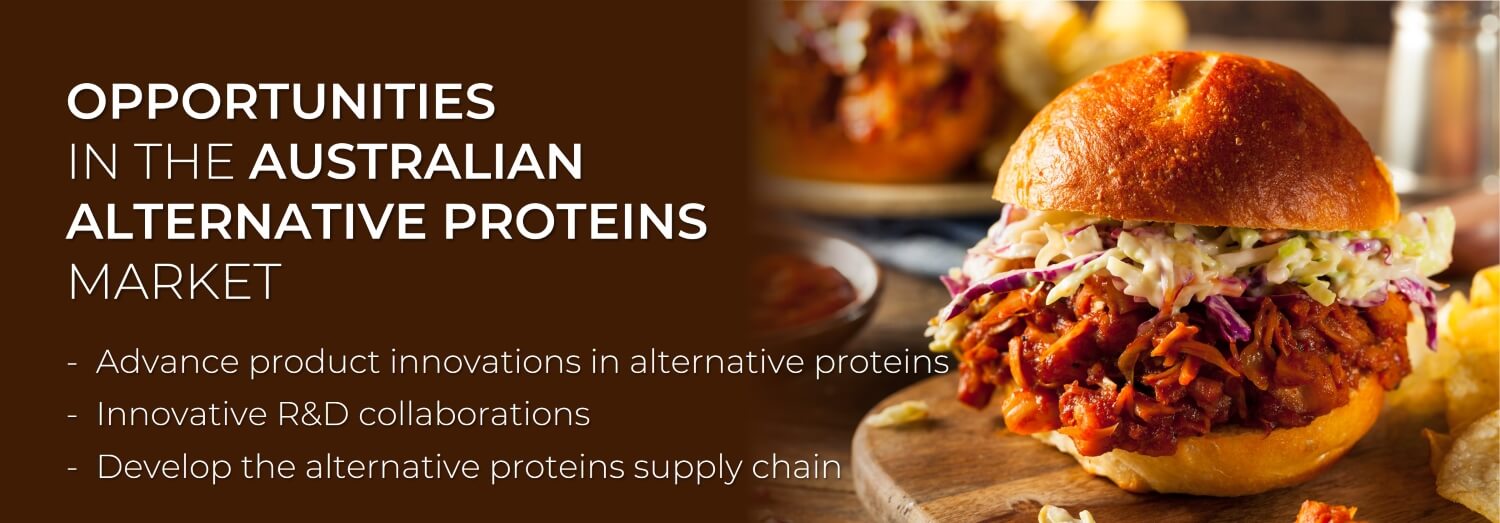Alternative Proteins
Melbourne delivers 40% of Australia’s total food and beverage R&D.
Develop, test and produce your food innovations here. Find out how.
In line with the growing global demand for sustainable and ethical food sources, Australia’s alternative protein market is set to be worth more than A$6.8 billion by 2030, including $2.5 billion exports.1
Melbourne and Victoria’s robust agri-food foundation, advanced technological capabilities, and supportive business environment make it an ideal location for companies looking to innovate and expand in this dynamic industry.
One third of alternative protein companies in Australia call Victoria home. This includes pioneer companies such as Biospringer, General Mills Australia and Goodman Fielder.
Victoria’s alternative proteins sector produces a variety of products such as plant-based proteins, cultured meats, and insect-based foods.
The region is known for its strong agriculture, advanced research facilities, and a focus on food technology and innovation. It boasts advanced manufacturing, world-class research institutions, and a collaborative ecosystem that encourages innovation. The state is also a leading hub for biotechnology and food technology, attracting top talent and investment.
Opportunities in alternative proteins
Advance product innovation in alternative proteins
- Develop new and improved plant-based protein products that closely mimic the taste and texture of meat
- Utilise fermentation technology to produce specific proteins, fats and other components that can be used in food products
- Develop consumer and animal feed friendly products that incorporate insect proteins
Innovative R&D collaborations
- Develop scalable bioreactor technologies for cell culture
- Leverage partnerships with Victoria's leading research institutions
- Partner with traditional food companies to incorporate fermentation based ingredients into their products
Develop the alternative protein supply chain
- Opportunity to vertically integrate the entire supply chain, from raw material production to manufacturing and distribution
- Develop reliable and scalable sourcing strategies for alternative protein ingredients
- Develop capability to manufacture high quality isolates, concentrates and textured vegetable proteins
- Improve logistics and distribution networks to ensure product freshness and availability
Why Melbourne?
Established world-class agrifood ecosystem and supply chain
- In 2021-22, Victoria’s gross value of agriculture production reached a new record high of $20.2 billion, accounting for 23% of Australia’s agriculture production2
- $20.2 billion gross value of agriculture production - a new record high, accounting for 23% of Australia’s agriculture production2
- Valued at $36.9 billion Victoria leads the nation in food manufacturing
- Victoria accounted for 40% of Australia’s total food and beverage R&D in 2021-22, the highest of all Australian states3
- Victoria has over 14 agricultural R&D facilities and world-leading food innovation centres
- Victoria has a strong competitive advantage exporting to Asia’s largest markets compared to North America and Europe, enabled by Australia’s free trade agreements
- Victoria is Australia’s largest food and fibre exporter with exports valued at $19.6 billion in 2022-23, 24% of national share
- Australia exports more than 70% of its high quality, traceable protein commodities, including grains, legumes, and meat4
- Major crops produced in Victoria include wheat, barley, lentil, faba and field pea. Minor crops include oats, lupin and chickpea.
- Other crops produced in Australia include canola, pulses and oats. Pulses include field pea, faba and broad bean, chickpea, lentil, lupin and mung bean. Soybean production is limited.
- Melbourne also offers co-working lab spaces and contract manufacturers, such as Co-Labs Melbourne and Yild Technical Spaces
Leverage Melbourne’s world-class R&D capacity and skills
- 154,600 employed in Victoria’s agriculture production and manufacturing sectors in 2021-22.5
- Melbourne has world-class expertise in agriculture, biotechnology, and food technology
- Melbourne boasts a robust workforce of scientists, engineers, and food technologists
- Victorian universities offer courses in Agricultural Science, FoodTech and Biotechnology, and are developing highly transferable intellectual capital and skills in:
- Food science and technology
- Biomedical and stem-cell research
- Bioprocessing and technology
- Agriculture and crop science
- Victoria is a leader in food and biotech research and commercialisation, and strong on industry partnerships. Key initiatives include:
- AgTech facility (Monash University in partnership with Bosch)
- Food Innovation Centre and Incubator (Monash University)
- Food Innovation Centre (CSIRO)
- AgriBio Centre for AgriBioscience (La Trobe University in partnership with Agriculture Victoria)
- Consumer, Analytical, Safety and Sensory (CASS) Food Research Centre (Deakin University)
- Food Research and Innovation Centre (RMIT)
- Future Food Hallmark Initiative (Melbourne University)
- RMIT Food Research and Innovation Centre
- Advanced Food Systems Research (Victoria University)
- Future Food Deakin
- Horsham Grains Innovation Park
Benefit from supportive state and federal governments policies and programs
- $65 million funding for a strategy for Victorian agriculture
- $2 billion Breakthrough Victoria Fund to help innovators and businesses commercialise their products. It has recently funded Eden Brew
- The federal government’s Research & Development Tax Incentive
- The Victorian Government’s Manufacturing Statement: Made In Victoria 2030 and Innovation Statement prioritise expanding Victoria’s advanced food manufacturing and world-class innovation precincts. It is committed to investing in high-growth sectors
- ‘Alternative proteins’ is identified as a priority emerging industry in the Victorian Government’s Strategy for Victorian Agriculture
- The CSIRO’s National Protein Road Map identifies five key areas for investment to turn primary inputs into higher-value products for national markets
- The Victorian Government is collaborating with industry and research institutes to achieve CSIRO’s Future Protein Mission
- The Victorian Government has sponsored Australia and New Zealand’s inaugural Alt Proteins 22 Conference, Alt Proteins 23 and Alt Proteins 2024
- Access to Agriculture Victoria’s pre and on-farm R&D capabilities, infrastructure and support programs, including:
- National pulse breading program
- Ongoing pulse research as value value-added ingredient in food and beverages
- Support capability - speed breeding glasshouses, Free Air Temperature Extreme (FATE) infrastructure, Centre for Digital Agriculture – remote sensing
3. Food and Beverage Manufacturing Factsheet, February 2024.
4. CSIRO, Protein – A roadmap for unlocking technology-led growth opportunities
Ready to unlock your business potential? We're here to help.
Let us help you tailor your business case to enter the Australian market and set up your Melbourne operations.
Explore how we can help.






